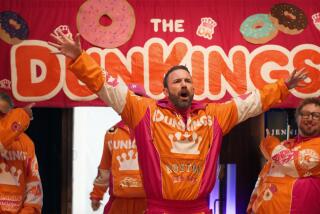The Effects of Super Bowl Holiday : There’s a Decrease in Depression as Game Loses Interest
- Share via
AUGUSTA, Me. — Football fans who perceive Super Bowl Sunday as a national holiday may be in for a dose of post-game blues, although a researcher says the potential for wide-scale depression is probably decreasing.
Expectations of excitement, fed by media hype, have created what amounts to a new American holiday on the day the Super Bowl is played, according to Loren Coleman, an expert in psychological aspects of sports.
But some dull and lopsided games in recent years have lessened the glow of the televised football extravaganza, which Coleman says winds up the Christmas season the same way New Year’s Day once did.
“Expectations of the game to end all football games have been blown away,” said Coleman, of the Human Services Development Institute, a think tank at the University of Southern Maine in Portland. “Most people are wising up enough that they’re not going to get depressed.”
Unfulfilled expectations of joy and excitement are known to cause depression around traditional holidays, Coleman said. Some figures, while not statistically significant, also suggest higher suicide, suicide-attempt and homicide rates on Super Bowl Sunday and immediately afterward, he said.
Between 1972 and 1984, an average of 69.6 suicides were recorded in the United States on days the Super Bowl was played. The average on previous Sundays during the same years was 66.3, Coleman said.
Though the day’s importance may be fading, “Super Sunday” maintains its psychological holiday status, particularly among the millions of American males who are likely to watch the game no matter how lackluster it promises to be, said Coleman, who planned to go to a movie instead of watching Super Bowl XXIII.
And a Super Bowl matchup between particularly talented and well-known rivals could suddenly restore the game as a day of high expectations and bolster its holiday status.
“Not that many people are going to get (even) mildly depressed after the game tonight,” Coleman predicted of Sunday’s meeting between the San Francisco 49ers and Cincinnati Bengals.
But, for those who do have a tendency to become depressed on that and other holidays, Coleman suggests staying away from alcohol, which is associated with many holiday deaths, and gambling on the game.
Coleman, who has written a book detailing when most suicide incidents are clustered, also recommends returning to a normal work routine as soon as possible after the game.
It is a mistake for anyone with post-game depression to take a day off from work and stay home, said Coleman. Those who are depressed “should do whatever they need to do to feel good about themselves--that’s the important thing.”
More to Read
Go beyond the scoreboard
Get the latest on L.A.'s teams in the daily Sports Report newsletter.
You may occasionally receive promotional content from the Los Angeles Times.










